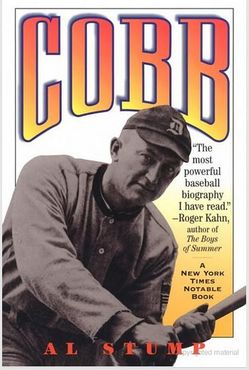Cobb: A Biography By Al Stump
Cobb by Al Stump
FOLLOWING his first appearance, he read in Detroit's Free Press:
"Cobb, the juvenile outfielder, got away well. Tyrus was well-received and may consider a two-base pry-up as a much better career opener than usually comes a young fellow's way."
Sportswriters also liked his stance at bat, marked by a slight crouch with feet close together, his rather heavy 38-ounce club (about 2.4 pounds) held steady at shoulder height and set to whip around in coordination with a short forward stride. His swing was a contained, economical one, not from the heels. In a rematch with the New Yorkers the next day, August 31, the opinion of the press was split. Some observers cheered his two singles in four times up off right-handed change-up specialist Jack Powell, a 23-game winner in 1904.
His base hits were a useful contribution to a 5-0 Tiger shutout of the Highlanders. But offsetting this was a first- inning headfirst steal attempt in which the catcher's throw easily beat him. That allowed baseman '''Kid Elberfeld''' time to slam his knee into the back of Cobb's neck and grind his face into the dirt. "The professional teach;' it was called—a naked attack on apprentice ballplayers to discourage stealing. Cobb's nose was skinned and he bled a bit. Bill Armour said, "I wanted to see what you could do against Red Kleinow's arm. It was damned dumb to go in leading with your head."
Down in Augusta, months earlier, George Leidy had warned him of the same error. After Elberfeld's roughing-up, Cobb rarely went into a base other than feet first, with neck muscles bunched. He filed away the name of Norman Arthur "Kid" Elberfeld for purposes of evening the score at another time—if there was another time. ...
The timing of the wedding—August 6 (1908) —was not exactly appreciated by the Detroit management. In the hunt for a second straight league title, Detroit was in first place by one game over the St. Louis Browns by late July, with their most valuable man hitting close to .340 At Boston Cobb had sneaked in from the outfield to trap a runner off second base for an unassisted putout; he had raced from first base to score on an infield hit while the Beantowners threw late or wildly; had gone 3 for 4 in batting against Boston's Cy Young. He had hit Kid Elberfeld's New York club so reach!) that the Kid was convinced he had been tricked, and cried, "The ball's been treated—it's not legal!" Elberfeld raised so much hell about something being "not right" with the ball that an umpire used a knife to cut it in half. It was legal.




